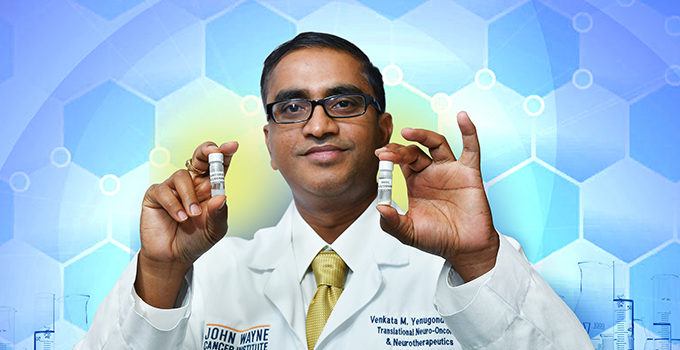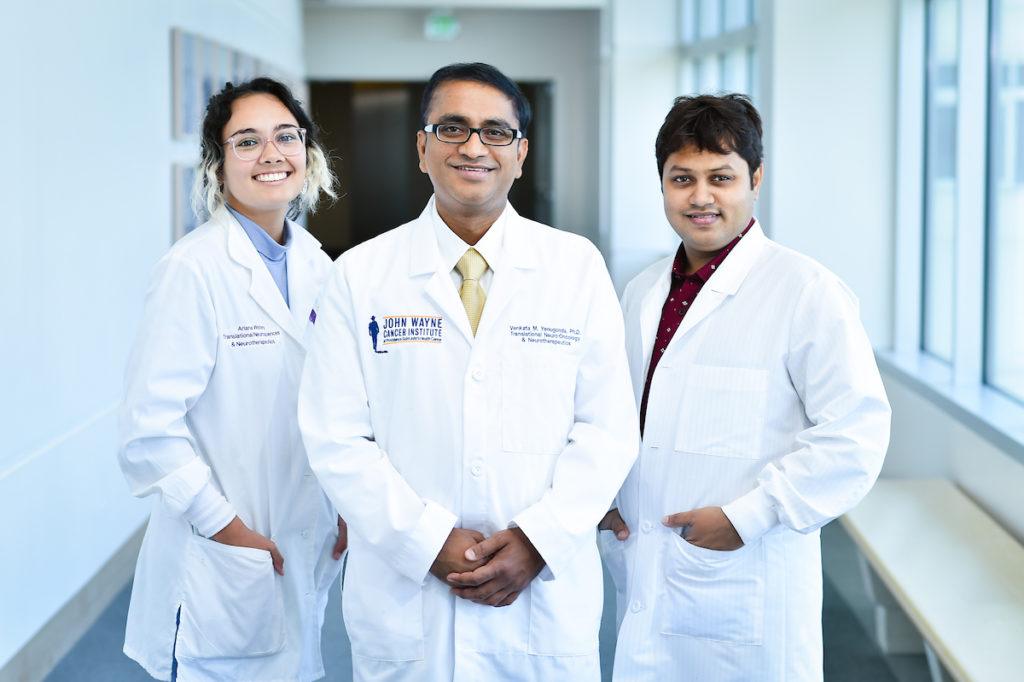

Researcher Spotlight: Dr. Venkata Yenugonda, Keeping A Dream Alive
by Nikki Mena
Far Away Beginnings
Walking into the office of Dr. Venkata Yenugonda at the Saint John’s Cancer Institute (formerly Saint John’s Cancer Institute, JWCI), the untrained eye is immediately overwhelmed with rows of textbooks and stacks of academic papers boasting hefty titles related to his work as a distinguished research scientist in drug development and drug delivery in the fields of oncology and neurosciences.
Dr. Yenugonda is the director of the Drug Discovery and Nanomedicine (DDNM) Research Program at JWCI and PNI, as well as Associate Professor in the Department of Translational Neurosciences and Neurotherapeutics at JWCI, and he is determined and passionate about finding solutions to some of medicine’s most daunting diseases.
Dr. Yenugonda was born in Kadapa, a city in the Indian state of Andhra Pradesh, located in the southeastern region of the country. When you ask Dr. Yenugonda what inspired him to go into medicinal chemistry and science, he immediately credits his father for instilling a love for science in him at an early age. His father was a man of humble beginnings, who was not only the one person in his family, but his entire village to be interested in education.
For many Americans, it is difficult to imagine sitting in a car or bus for more than 20 minutes to get to school, let alone having to walk 20 miles to school, but this was the reality his father chose each and every day in pursuit of his dream of earning his education. Like his father, a community health officer acclaimed for his work in ensuring proper care of rural people in his community, Dr. Yenugonda is driven by his desire to better mankind by developing safe, effective and affordable drugs for difficult diseases that can be easily accessed by everyone.
Hard Work Pays Off
 Along with the rows of books and stacks of articles, you can find numerous awards, certificates, degrees and other acknowledgements exemplifying his excellence in his field, embellishing his office walls. Dr. Yenugonda’s career highlights include working on treatments of nicotine and alcohol addiction, various novel cancer treatments, drug development for Alzheimer’s disease, serving as an advisor for biotech startups and membership in the National Academy of Inventors. However, as any successful international scientist can attest, to make it as an outstanding researcher in competitive programs like those Dr. Yenugonda attended at the Indian Institute of Chemical Technology, Georgetown Lombardi Cancer Center, and now JWCI and PNI, the hard work and determination must begin at an early age.
Along with the rows of books and stacks of articles, you can find numerous awards, certificates, degrees and other acknowledgements exemplifying his excellence in his field, embellishing his office walls. Dr. Yenugonda’s career highlights include working on treatments of nicotine and alcohol addiction, various novel cancer treatments, drug development for Alzheimer’s disease, serving as an advisor for biotech startups and membership in the National Academy of Inventors. However, as any successful international scientist can attest, to make it as an outstanding researcher in competitive programs like those Dr. Yenugonda attended at the Indian Institute of Chemical Technology, Georgetown Lombardi Cancer Center, and now JWCI and PNI, the hard work and determination must begin at an early age.
Dr. Yenugonda’s mother worked to instill diligence and dedication in her son from when he was young, which resulted in him finishing elementary school at the top of his class in math and science. His academic excellence as a young boy allowed him to attend one of the most prestigious high schools in India, where he finished first of his class. Dr. Yenugonda’s prestigious academic record continued through his undergraduate and graduate studies, culminating in doctoral training focused on nanochemistry and nanoformulations.
The research he conducted throughout his doctoral training earned him numerous awards and publications which ultimately helped launch his career in the United States when he received an invitation to work as a postdoctoral research fellow with Dr. Esther H. Chang’s lab at Georgetown’s Lombardi Cancer Center. He continued his postdoctoral training at Georgetown in the drug discovery program under the guidance of Dr. Milton L. Brown and his success resulted in his promotion from fellow to faculty, where he remained until 2016 when he left Washington D.C. to join the JWCI and PNI team in Santa Monica, CA.
Neuroscience and Privademics
Working with PNI physicians and researchers Dr. Santosh Kesari and Dr. Achal Singh Achrol, along with the rest of the translational neuroscience and neurotherapeutics research team, Dr. Yenugonda is presently developing drugs to treat and hopefully cure Alzheimer’s Disease, eradicate brain cancer and to safely and effectively treat nicotine and alcohol addictions. The DDNM research program utilizes a unique, two-pronged approach, combining drug discovery tools and nanotechnology tools to circumvent existing clinical problems.
He enjoys working at PNI because it allows him to take advantage of the unique opportunity to collaborate with the brightest minds across neuroscience and oncology research areas. Working closely with the physicians allows him to put scientific breakthroughs to the test through clinical trials and he is uniquely afforded the chance to gain immediate feedback into what is working and what is not so that he can refine his work in the lab to suit the needs of the patients.
 In the 10 years that Dr. Yenugonda has worked in a lab setting, he has found that his exposure to the clinical side has elevated his research to the next level and allowed him to find solutions and answers in a less arduous setting than what he had experienced in other more restricted academic settings. Furthermore, this “privademic” setting at PNI, which combines the best of both private and academic institutions, has allowed him the flexibility he has long desired in the drug discovery and development process.
In the 10 years that Dr. Yenugonda has worked in a lab setting, he has found that his exposure to the clinical side has elevated his research to the next level and allowed him to find solutions and answers in a less arduous setting than what he had experienced in other more restricted academic settings. Furthermore, this “privademic” setting at PNI, which combines the best of both private and academic institutions, has allowed him the flexibility he has long desired in the drug discovery and development process.
Dr. Yenugonda is grateful for his introduction to PNI and JWCI, and he credits Dr. Kesari who recruited his expertise in 2016. His successful move from an academic drug discovery environment to a truly personalized patient-centric translational and collaborative research setting has had many benefits. Working with PNI and JWCI, Dr. Yenugonda is better equipped to focus on limiting the length of time involved in the drug discovery process to fulfill his goal of developing affordable drugs for some of the most pressing medical insults we face.
PNI and Beyond

Today, Dr. Yenugonda and his team are busy with various grant applications, working on completing ongoing projects, and initiating new ones. Their current research activities pertain to new drug development, drug repurposing, and nanoformulations. They are currently targeting cures for triple negative breast cancer, prostate cancer, CNS cancers, Alzheimer’s disease, depression, drug abuse, head and neck cancer, and pediatric and adult brain cancer.
Dr. Yenugonda is eager to acquire more research funding to expand his research team. Through his Drug Discovery and Nanomedicine Research Program, he is eager to find a cure and to develop safe and cost-effective drugs which clinicians can use for patients at PNI, Saint John’s Health Center, and around the world.
At PNI and JWCI, Dr. Yenogonda believes that he can attain his goal of streamlining the notoriously long drug discovery process to create safe, effective and affordable medicine for patients more quickly and efficiently. His hope is that in the coming years he will be able to build a center for drug discovery and nanotechnology within PNI.
He credits much of his success to the endless support and encouragement he receives from his wife and son, who allow him to work long hours in the lab and after hours when he brings his work home. He feels very lucky to have a family that not only fosters his growth and progress as a world-class researcher, but also understand the pressing urgency that exists to find cures and his determination in being the one to get there. Dr. Yenugonda follows in the footsteps of his father by championing scientific interest and discovery in his young son Tanmay, who aims to one day become a doctor.
Ultimately, Dr. Yenugonda dreams of creating a center at JWCI and PNI where he can continue to do research and also teach the next generation of neuroscientists and clinicians. He and his research colleagues know that they are racing against time to develop effective treatments against deadly cancers and debilitating neurological disorders. Dr. Yenugonda’s dream to make the world a better place is being realized at JWCI and PNI as he leads his team and collaborators to the forefront of cutting-edge cancer and neuroscience research.
About the Author

Nikki Mena
Nicolette Mena is the PNI Foundation Program Coordinator and is involved with all administrative and operational aspects of the Pacific Neuroscience Institute Foundation. She focuses on raising awareness of PNI, through composition of blog posts, video appeals, newsletters, and materials for the bi-annual magazine. Fundraising is Nikki’s priority, with her efforts geared toward grant writing and coordination of outreach events. She works closely with medical experts, Saint John’s Health Center Foundation’s development team and PNI Foundation’s Directors to expand PNI’s brand both domestically and internationally.
Last updated: April 2nd, 2020